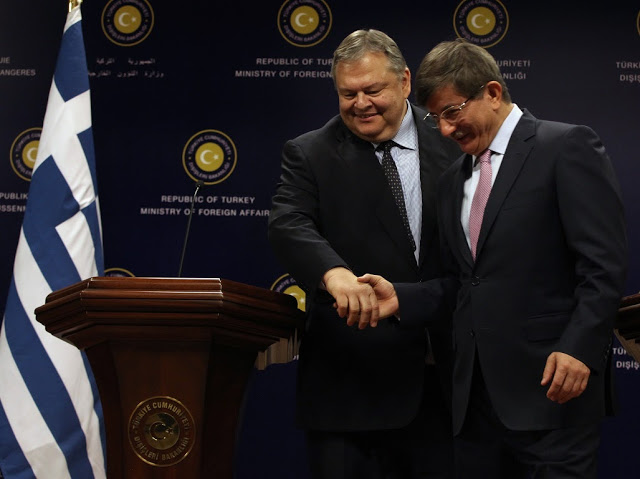Prime Minister Ahmet Davutoğlu will be visiting the Greek capital of Athens on Dec. 5-6, at a time when Greece and Greek Cypriots are forming a new alliance with Egypt and Israel and excluding Turkey and Turkish Cypriots from energy cooperation agreements in the east Mediterranean.
Professor Hasan Ünal from Atılım University's department of international relations told Sunday's Zaman that the meeting between Davutoğlu and Greek Prime Minister Antonis Samaras coincides with Turkey's increasing isolation, as all the major actors in the Mediterranean region are building up alliances against the country.
Egyptian President Abdel Fattah el-Sisi hosted a meeting with Greek Cypriot leader Nicos Anastasiades and Samaras in Cairo in early November, after which they announced new cooperation in energy and regional security.
Both Greek Cyprus and Egypt have also strengthened their relations with Israel. Meanwhile, Turkey is at odds with both Egypt and Israel. Turkey supported the administration of Mohammed Morsi, a member of the Muslim Brotherhood, when he was toppled by Sisi in 2013. Since then, Turkish officials, particularly President Recep Tayyip Erdoğan, have been critical of the “military coup” in Egypt, and of the West, for maintaining relations with Sisi.
Turkish-Israeli relations turned sour after a Gaza-bound aid flotilla was attacked by Israeli forces in May 2010, killing eight Turkish citizens and a Turkish-American. Israel formally apologized in 2013 for what it called “operational mistakes” that might have led to the death of Turkish citizens. Turkey and Israel have been negotiating a compensation deal, but an agreement is not yet forthcoming.
Israeli bomb attacks in the Gaza Strip and Turkey's subsequent harsh criticism over the summer also caused more strain in the relationship. Nationwide protests against Israeli attacks in the Gaza Strip took place in Turkey, with thousands participating.
According to Ünal, the Turkish government is making a mistake by downgrading its relations with Israel, and the strained ties between Turkey and Israel is the reason why Israel is taking the side of Greek Cyprus and encouraging Greek Cyprus' drilling activities in the Mediterranean.
“Greek Cyprus has attempted to drill for natural gas in the Mediterranean before, but it couldn't go further due to Turkey's firm stance against those activities. This time, however, Greek Cyprus has the support of Israel, which has dispatched its navy and warplanes to deter other countries from hindering the drilling activities of Greek Cyprus,” Ünal explained.
Cyprus was divided into a Turkish north and Greek south in 1974, after Turkey intervened militarily following a coup attempt aiming to unite the island with Greece. The Turkish Republic of Northern Cyprus (KKTC), in the north of the island, is recognized only by Turkey. Turkey does not recognize the Greek Cypriot administration in the south, but the international community considers the Greek Cypriots as representatives of the entire island.
Cyprus on the agenda
Davutoğlu is expected to discuss the Cyprus issue with his Greek counterpart during his visit.
Peace talks, which resumed in February of this year, were recently suspended by the Greek Cypriots following Turkey's decision to search for oil and gas in waters where the Greek Cypriot government has already licensed companies to drill.
Çanakkale 18 Mart University Professor Mehmet Hasgüler told Sunday's Zaman that diplomatic initiatives, not even UN-mediated ones, will be insufficient to overcome the dispute in Cyprus.
Hasgüler said Turkey should open its ports and airports to Greek Cyprus in order to overcome the deadlock on the island. He stressed that finding a comprehensive solution in Cyprus is in the EU's best interest.
“The EU must find a way to resolve the gas row so that it can formulate a more sound energy policy in Europe, as it is currently in pursuit of alternative energy supplies other than Russian energy,” Hasgüler added.
Turkey-Greece business forum
During Davutoğlu's visit, an event titled “Turkey-Greece Business Forum” will take place in Athens. The Turkish-Greek Business Council, an affiliate under the Foreign Economic Relations Board (DEİK) of Turkey and its Greek counterpart, the Hellenic Federation of Enterprises (SEV), are organizing the forum to boost economic cooperation between the two countries.
Speaking to Sunday's Zaman, Turkish-Greek Business Council President Tevfik Bilgen explained that the business forum will help both countries discover their trade potential.
“This is a good opportunity for business executives from both countries in that they can discover new potentials in terms of trade. Also, the ministers will meet with their counterparts to sign agreements for the sectors they are involved in,” Bilgen added.
The trade volume between Turkey and Greece reached $5.6 billion in 2013, up from $800 million in 2003. A total of 591 Greek firms operate in Turkey, with total investments worth $6.7 billion.









